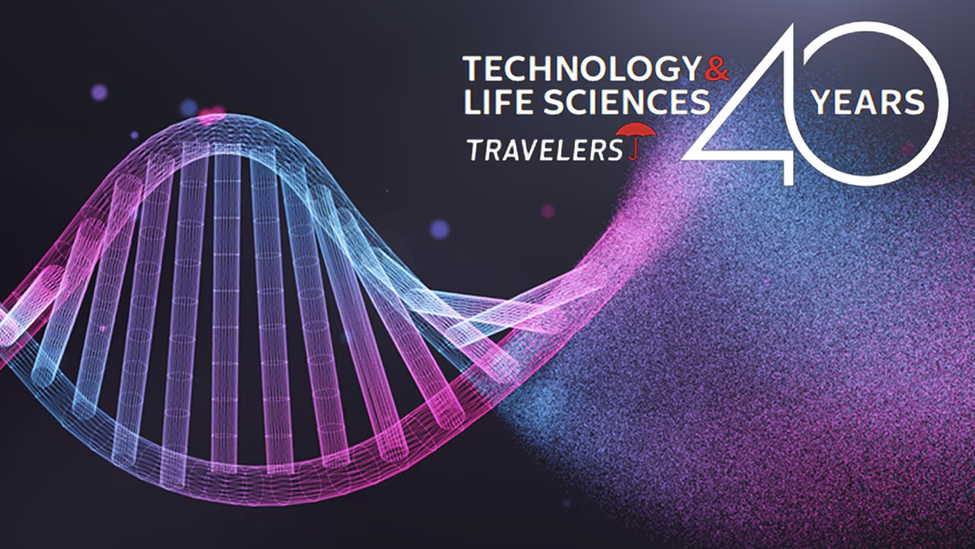Growth and Evolution of MedTech and Life Sciences

Craig Mounser, Med Tech & Life Sciences Practice Leader at Travelers Europe, discusses the significant growth and challenges in the Medical Technology and Life Sciences sector in the UK and Ireland, highlighting investments, AI advancements, and the role of Travelers in supporting industry needs.
(SPEECH)
[MUSIC PLAYING]
(DESCRIPTION)
Logo: Travelers. Two men in suits and ties sit in chairs in front of a bouquet of flowers in a vase on a side table.
(SPEECH)
MARK: Craig Mounser is Medical Technology and Life Science Practice Leader at Travelers. He joins me now. Well, Craig, the medtech and life sciences sector, how much has that evolved in the UK and Ireland in recent years?
CRAIG MOUNSER: Particularly in the UK, it's evolved significantly. There's been huge investment in the UK in terms of health research and development, to the point that as a percentage of gross domestic product, the UK is second behind only the USA in terms of that level of investment. So in 2022, it's believed there was £9 billion was invested into pharmaceutical research and development.
MARK: And why is this happening? What's driving this?
CRAIG MOUNSER: Well, to a degree, some of it simply comes down to demand. Both the UK and Ireland have growing populations, ageing populations. And as the population ages and grows, there is a greater demand for investment into health care. As people live longer, we need more innovation going into medical devices.
MARK: Ageing population is one thing, but lots of countries have got ageing populations. So is there anything else that's important here?
CRAIG MOUNSER: Sure, absolutely. You're absolutely right. Throughout Europe, every country has got an ageing population. I guess what makes the UK and Ireland so unique is the fact that they've got this research ecosystem built within the country. So both governments are keen to really promote their expertise in this sector.
So both countries have innovation hubs essentially. Within the UK, you have areas such as London, Cambridge, and Oxford. Within Ireland you would have Dublin, Galway, and Cork, who have essentially created geographical hubs that focus on biotech and medical devices. In both countries, you've seen education and a programme of training going into really fostering a workforce that is highly skilled in the life science industry.
MARK: Anything else that's happening, any other bits of funding from third parties or governments that's designed to accelerate this growth
CRAIG MOUNSER: Sure, so in the UK, as part of the government's aim to make the UK a science superpower, they've recently announced a 650 million pound investment into the life science industry. Similarly, within Ireland, we've seen that the Irish government has made it beneficial for overseas companies to invest within the island of Ireland because of their competitive corporate tax environment. Also strong regulatory environment has enabled that to happen.
MARK: And is there any evidence that all of this is helping to crowd in private capital?
CRAIG MOUNSER: Yes, there is. Within the UK, we've seen £2.9 billion invested from private UK equity invested into life sciences and medical technology industry.
MARK: We read so much in the papers these days about AI. On balance, is that going to be positive or negative for these sectors?
CRAIG MOUNSER: That's a fair question. I think on balance the positives probably outweigh the negatives, but there certainly are challenges that we need to consider in this sector.
MARK: Well, you mentioned the positives. What are they?
CRAIG MOUNSER: First and foremost, if we look at the way AI is used in medical imaging, so if you imagine a scanning, a scan that traditionally would be looked at by a human, AI can analyse that image much faster and more accurately than a human eye can, leading to quicker diagnosis and quicker treatment ultimately.
So the second key point would be predictive analytics. Predictive analytics is where AI can determine the likelihood of a person developing a certain condition. And that certain condition will be looked at in terms of the likelihood based upon genetic history, environmental factors, and lifestyle factors.
And the third point is AI in robotic surgery. So AI in robotic surgery means that precise invasive surgery can be undertaken on patients without the risk of human error, thus increasing or improving the patient's recovery times.
And finally, clinical decision support. So clinical decision support is essentially where data is pulled from a variety of sources. So the AI will pull data from research, from literature, and from patient data to recommend the best course of treatment for the patient.
MARK: So a number of potential positives there. But what are the challenges that AI might well present in this space?
CRAIG MOUNSER: So one of the main challenges relating to AI in medical technology is the huge volumes of data that AI is reliant upon. So huge volumes of patient health records inevitably means that there's an increased threat of a cyber hack on that data to try and obtain those data health records.
The second key issue I would say associated with AI in medical technology is AI bias. AI bias is where ultimately the algorithm is taught by an unrepresentative sample. The danger of that being that there are certain demographics within a population that are unrepresented, and that creates an inequality with regards to the health received.
MARK: Well, Craig, you've talked a lot about what's going on in the sectors, but what is Travelers up to meet the demands of clients in the medical technology and the life sciences spaces?
CRAIG MOUNSER: So this is Travelers 40th year of providing insurance solutions to companies in the medical technology space. We're continually adapting and shaping our wording and coverage to meet the needs of the clients in this sector, and continually training and growing our underwriting team to ensure that they move with these companies and continue to provide the support and the bespoke solutions that are required.
MARK: We have to leave it there. Craig Mounser, thank you.
MARK: Thank you, Mark.
[MUSIC PLAYING]
(DESCRIPTION)
Text: Visit Travelers.co.uk or email [email protected]. Logo: Travelers.
Text: Information and opinions contained in this interview have been arrived at by Travelers, and any underlying research or analysis has been procured by Travelers for its own purposes. It does not, and it is not intended to, provide legal, technical or other professional advice. Travelers and the Travelers Umbrella logo are registered trademarks of The Travelers Indemnity Company in the U.S. and other countries. All other registered trademarks are the property of their respective owners. Travelers and Insure TV accept no liability for any loss arising from the use hereof nor make any representation as to their accuracy or completeness. Travelers is authorised by the Financial Conduct Authority, and it operates through several underwriting entities through the UK and across Europe. Please consult your policy documentation or visit the websites below for full information. travelers.co.uk travelers.ie.


